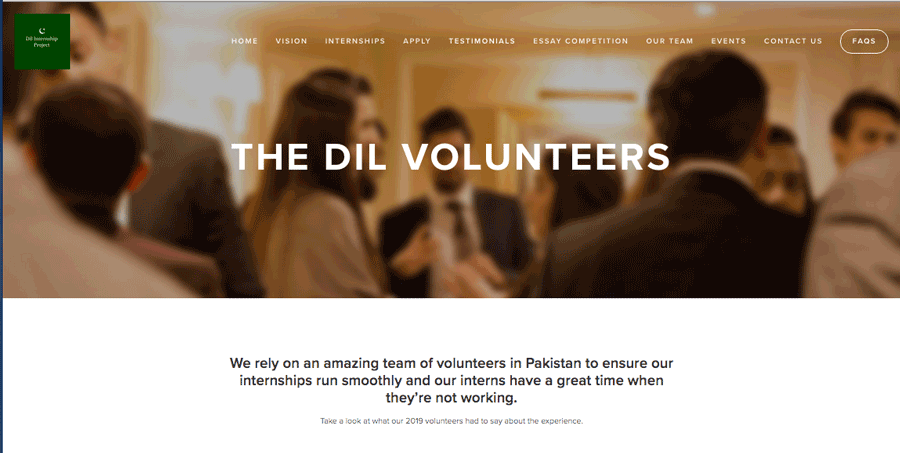One from the Heart
By Mahnoor M. Farooqui | Newsliners | Published 6 years ago
“The numerous times I was told about the dangers and uncleanliness of Karachi before coming here had lowered my expectations of the city…Taking part in Dil Internship taught me one important thing: Pakistan cannot develop further if we, especially overseas Pakistanis, only continue to complain about what’s wrong with this country instead of being willing to take part in change.”

A user-friendly interface and an extensive network of the DIP team across the globe makes for a streamlined internship experience.
Of the many online testimonials from the 2019 Dil Interns, on the Dil Internship Project website, this one rang most true. Tired of seeing Pakistan portrayed as only needing aid, sympathy and charity, and being consistently devalued in spite of its growing contribution to the global stage, the Dil Internship Project (DIP) was started. This social enterprise — founded by Oxford student Mustafaen Kamal — aims to foremost, resolve Pakistan’s ‘brain drain,’ and move beyond the narrative of an underdeveloped and “war-torn” country.

Many from the 2019 batch went on to join the DIP family to help other students experience Pakistan the way they did.
Still in the first year of their inception, DIP partnered with eight private companies, schools and major industry players to create a holistic internship experience where international students could come to Pakistan to work and experience life and the local culture of young Pakistanis.
With an extensive network of 30 volunteers across the United Kingdom, United States, Canada and Australia, DIP was successfully able to raise funds, establish a credible presence on social media and have their representatives and campus ambassadors visit universities for its first round of internships in the summer of 2019.
Nearly 930 students of over 23 nationalities applied for the programme. The students came from top universities including Cambridge, Oxford, Berkeley and Imperial College London, among others. DIP whittled down the applicants to 23 students who fit their requirements and arranged professional internships in places ranging from multi-national corporations and schools, where they were paid competitive salaries.
While all living and security expenses were covered for the students, the DIP also collaborated with a cultural tourism partner, Potential Pakistan, to take them around Pakistan’s biggest and most well renowned heritage sites, and leading network HUM TV, to visit their offices and attend the premiere of the blockbuster, Superstar.

DIP chronicled the entirety of their 2019 batch through their Instagram account @dilinternshiproject.
“We wanted it to be as authentically Pakistani as possible, not just to-and-fro from work,” says Annia Mirza, the Director of Operations for DIP. “The students weren’t expecting to fall in love with Pakistan, the way they did. They added a fresh perspective and lots of value to their workplaces and the DIP itself.”
The intiative — as reviewed by a company who specialises in management consultancy – was indeed so successful that it has already boosted the economy by seven million rupees, over the course of just one year. Currently operating only in Islamabad, Karachi and Lahore. DIP is working on expanding to the northern areas of Pakistan. They’ve caught the eye of public sector employers – including the Federal IT ministry, the Climate Change ministry, the Government of Gilgit-Baltistan, local educational bastions BNU, Comsats and LUMS and Liaquat Merchant Associates and the Karachi Down Syndrome Program – who are keen to partner with them, offering internships.
Fast evolving, the DIP is looking to incorporate a lot more tech, partnering with a Technical Education and Vocational Authority (TEVTA), to accommodate students who are unable to geographically relocate for the internship. “It’s done remotely, and is an alternate route for people to get involved,” says Annia. “It’s less conventional, with less commitments, and accommodates those who have social anxiety, while helping students collaborate and pool their resources and knowledge with local Pakistani students.” After the internship, many students have joined the Dil Internship Project, volunteering their time to work for operations, recruitment and more.


